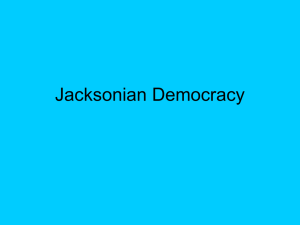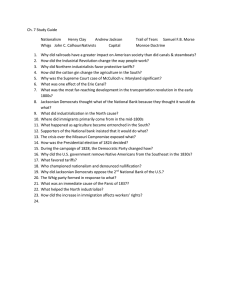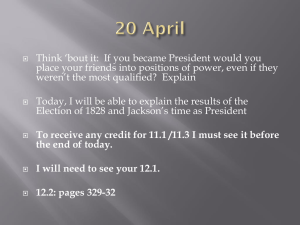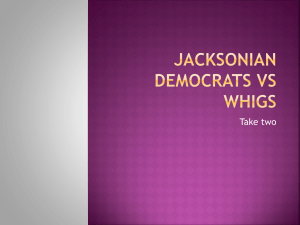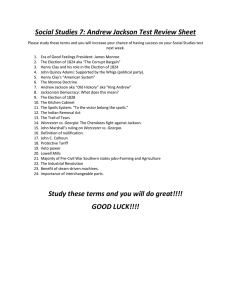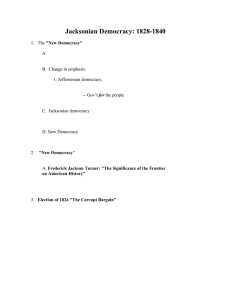Ms. Evers Presentation: Jackson
advertisement
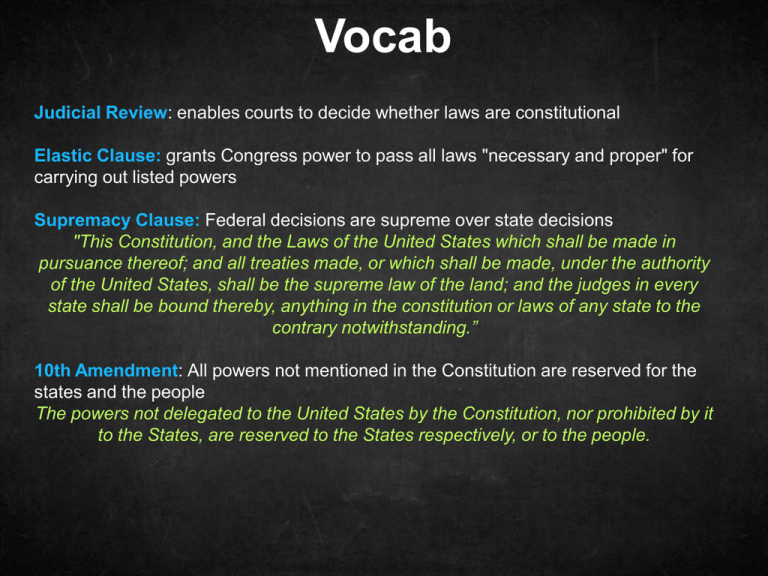
Vocab Judicial Review: enables courts to decide whether laws are constitutional Elastic Clause: grants Congress power to pass all laws "necessary and proper" for carrying out listed powers Supremacy Clause: Federal decisions are supreme over state decisions "This Constitution, and the Laws of the United States which shall be made in pursuance thereof; and all treaties made, or which shall be made, under the authority of the United States, shall be the supreme law of the land; and the judges in every state shall be bound thereby, anything in the constitution or laws of any state to the contrary notwithstanding.” 10th Amendment: All powers not mentioned in the Constitution are reserved for the states and the people The powers not delegated to the United States by the Constitution, nor prohibited by it to the States, are reserved to the States respectively, or to the people. After Monroe... There was Adams Election of 1824 Why was this election a big deal? • more VOTERS with MORE ACCESS TO POLLS • How? • removing property qualifications • most electoral college now almost universally elected by people (rather than state legislatures) Era of Good Feelings Ends Election of 1828 • • • Adams = unsuccessful Presidency What did he believe? • pushed for freedom of speech, universal education, end to slavery, fair treatment towards native americans! • criticized for federal support for Erie Canal & Baltimore-Ohio Railroad (exceeded federal authority) Andrew Jackson = the "Superstar of his era" • leader of the "common man" • 3x as many voters show up! • party = Jacksonian democrats (democratic republicans) WARNING! Disappointing THEME: we fail to recognize the good ones when we have them, but celebrate the jerks! Andrew Jackson "Old Hickory" Ushers in the age of the "Common Man" First westerner to white house • "tough, capable general" OR "Ill tempered, stubborn, murderer, slave-trader, bigamist" "It is to be regretted that the originally wanted: rich and powerful too often bend the acts of government • limited government to their selfish purposes." • state power - AJ, July 10, 1832 • anti-National bank and tariffs • pro-slavery Jacksonian Democracy What was he like as President? Patronage: when a politician appoints friends and supporters to government jobs Spoils: loot taken from conquered enemy • Spoils System: • believed untrained, common folk, could do job too • replaced many with Jacksonian Democrats • Used VETO more than any other President • Earned him the nickname "King Andrew I" Tariff crisis: • 1828 and 1832 • South Carolina declared it could nullify this laws • Based on STRICT INTERPRETATION OF STATES RIGHTS (all powers that the constitution neither gives to the Federal government nor denies to the States) • suggested could even SECEDE if wanted to! • Jackson threatened to send 50,000 troops to enforce! • Remember most for... TRAIL OF TEARS Indian Removal • • • • • Seen as barrier to economic advancement Cherokee took issue to court Supreme Court ruled cannot move tribes Jackson ignores, supports forced removal Leads to Trail of Tears How did he limit democracy? • • • Slave owner Didn't support equality for women Indian Removal Act REVIEW POLITICAL STUFF So what should we know about Jackson? • Spoils System: President can hire new people, high turnover rate, don’t have to have special qualifications • Against the National Bank, but supported Tariffs • State’s Rights proponent but was a Unionist – threatened to use force against Nullification • Vetoes more acts of congress than all six previous Presidents combined • Jacksonian Democracy: • Higher voter participation, spoils system, ideas about limited government and local control Review: Whigs vs. Democrats Whigs saw themselves as defenders of liberty against a powerful executive. Trail of Tears Reading Please read the excerpt on the Indian Removal Act. Read all of the sources. When you are done reading all of the sources, write a reaction to the three that you found to be the most surprising or the most informative. Be ready to share your responses. Jackson's WAR ON THE BANK THE STORY: Second National Bank almost up West see's as monster of rich financiers and speculators from NY and New England some see as providing stability Jackson vetoes its continuance starts taking federal funds out & moving to state banks! these banks printed bank notes & lent recklessly result = fed govt couldn't accept bank notes (don't know how much they are worth!) Next... Panic of 1837! and depression into 1840s ruins (democrat) Martin Van Buren's Presidency Leads to election of William Henry Harrison (whig) and VP John Tyler Tyler (Southern Democrat) as president battles with WHIGS... ROUGH SECTIONAL ROAD AHEAD! Despite Nationalism... Many Sectional Issues The Bank... Tariffs purpose: Gen $ for government and drive up prices on foreign goods (encourage purchase of US made products) North likes, South & West Hate (little manufacturing to protect, and tariffs drove up prices) Land Cheap and Plentiful but even when cheap, sometimes too much (people often couldn't pay) banks over-lent, and often failed Congress lowers price of land... West likes, but North and East unhappy Federal funding of industries: Erie Canal and Road system North and West Happy, South Left Out Oh and let's not forget SLAVERY
